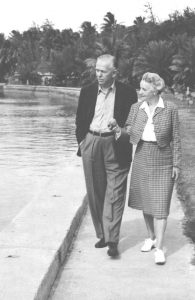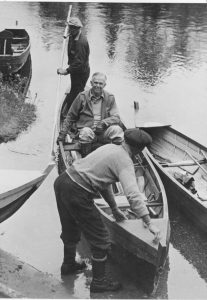 The month of March often finds people dreaming of, or actually going on, vacation to take a break from cold winter weather. On March 7, 1943, Chief of Staff of the Army George C. Marshall traveled to Miami, Florida, with his wife Katherine for a week-long vacation, his first since the United States had entered World War II. The great responsibilities that Marshall had during the war have led some people to conclude that he never took a vacation. While this myth is consistent with Marshall’s tireless work ethic, his appointment books for this period reveal that it has no factual basis.
The month of March often finds people dreaming of, or actually going on, vacation to take a break from cold winter weather. On March 7, 1943, Chief of Staff of the Army George C. Marshall traveled to Miami, Florida, with his wife Katherine for a week-long vacation, his first since the United States had entered World War II. The great responsibilities that Marshall had during the war have led some people to conclude that he never took a vacation. While this myth is consistent with Marshall’s tireless work ethic, his appointment books for this period reveal that it has no factual basis.
Marshall’s appointment books reveal that, with the exception of one day of duck hunting near Baltimore, Maryland, with the Chief of the Army Air Forces Hap Arnold a few weeks after the Allied invasion of North Africa, Marshall’s trip to Miami was his first vacation in 15 months. Marshall took only one more vacation in 1943, a fishing trip to Sainte Anne des Monts, Quebec, from June 22nd-25th.
Marshall began the year 1944 with another trip to Miami, Florida, departing on January 7th and returning on the 16th. His next vacation, which followed the successful Allied landings in France, took Marshall to the Adirondacks from August 9th to the 15th. A week later, Marshall traveled to California with Hap Arnold for a week-long fishing expedition.
With the exception of a four-day trip to his home in Pinehurst, North Carolina, at the end of February, Marshall did not take any vacation in 1945 until well after fighting in Europe had ended. On June 21st Marshall went to Oregon for a week-long fishing trip. In July Marshall used the occasion of his travel to the Potsdam and Yalta Conferences to make brief stops in Quebec, Bavaria, and Berchtesgaden for fishing excursions.
 During the 1,364 days the United States was engaged in World War II, Marshall’s appointment books record only 51 personal vacation days. This calculation does not account for weekends, which Marshall took as the status of the war would permit. Marshall’s concern for health and well-being was not limited to himself. He constantly warned his subordinates against overwork and regularly encouraged them to take breaks from their strenuous jobs.
During the 1,364 days the United States was engaged in World War II, Marshall’s appointment books record only 51 personal vacation days. This calculation does not account for weekends, which Marshall took as the status of the war would permit. Marshall’s concern for health and well-being was not limited to himself. He constantly warned his subordinates against overwork and regularly encouraged them to take breaks from their strenuous jobs.
In a message to General Dwight Eisenhower, who was in the midst of setting up his headquarters in England, dated December 29, 1943, Marshall wrote, “I think you made a mistake by not coming home first.… You will be under terrific strain from now on. I am interested that you are fully prepared to bear the strain and I am not interested in the usual rejoinder that you can take it. It is of vast importance that you be fresh mentally and you certainly will not be if you go straight from one great problem to another. Now come on home and see your wife and trust somebody else for 20 minutes in England.” After receiving the message, Eisenhower responded that he would immediately begin making arrangements for a trip to the United States.
If you enjoy learning about lesser known aspects of Marshall’s life and career you won’t want to miss the Marshall Legacy Series program “Marshall Myths and Little-known Facts” taking place at the Marshall Foundation on March 23rd at 5:30 PM. You can learn more about the program or RSVP to attend at the event page on our website.
